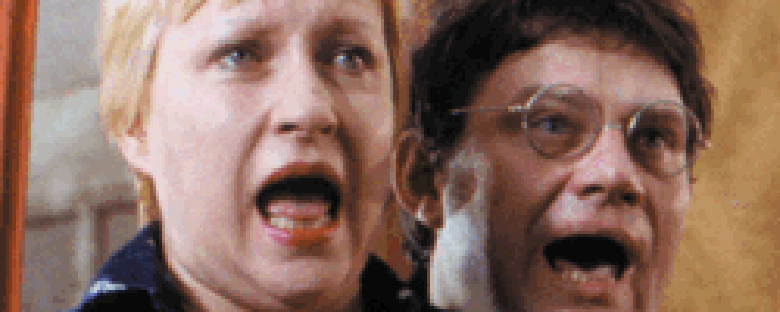Reviews
Satansbraten
Rainer Werner Fassbinder
Germany, 1976
Credits
Review by Matt Bailey
Posted on 11 July 2004
Source Wellspring DVD
Walter Kranz, a self-proclaimed “revolutionary poet,” hasn’t written a line in ages and his publisher refuses to give him another advance. Running out of money and at the end of his rope, he murders his mistress after she orgasmically writes him a check. Returning home to his harridan of a wife and his mentally retarded brother, Kranz begins to write again. After he has come up with what he believes to be his greatest poem, his wife reveals to him that he has merely plagiarized Stefan George, a fin-de-siècle poet who was considered the German Oscar Wilde, and not just for his poetry. Convinced of the greatness of Stefan George, Kranz slowly begins to believe he is George. His first course of action is to have a tailor fashion a suit like George’s for him, despite the tailor’s protests that Kranz is too fat for a suit like that. No sooner is the suit finished that Kranz begins recruiting young male acolytes to hear him recite George’s poetry as he wears a wig and stage makeup to appear more like George. Meanwhile, his wife must deal with dwindling finances, Kranz’s eccentric prostitute, his fly-obsessed brother, his utterly insane masochistic groupie who has now come to live with them, and her own painful gastrointestinal ailment. Kranz only begins to come to his senses when he enjoys being beaten on the street for stealing money from his prostitute. His groupie, appalled that she has been submitting herself to just another masochist, moves in with one of his mistresses’ husband. That mistress, now at a loose end, moves in with Kranz. Several other revelations and reversals occur until the level of mania returns to normal. Normal for Kranz, that is.
To those who only know Fassbinder as the director of coolly distanced melodramas, Satan’s Brew will come as quite a shock. It is a flat-out screwball comedy, but one that is pitch black in tone. Informed by but not dedicated to the idea of the Theater of Cruelty developed by Antonin Artaud, the film begins over the top in its depiction of Kranz as an absolute nutcase and only goes up from there. Sadomasochistic sex is treated as matter-of-factly as a handshake by all and torrents of verbal cruelty spew from the mouth of every character. The performances by all, particularly Kurt Raab as Kranz, Helen Vita as his wife, and Margit Carstensen as Andrée (a complete about-face from her Petra von Kant), are exquisite in their sustained hysteria. The film is so odd but so funny, it’s almost like Buñuel on crystal meth. My only complaint is that at 105 minutes, it’s about 15 minutes too much. The joke goes on for just a little too long, and by the time the twist ending is revealed, you’ve stopped laughing.
Despite being a comedy, Fassbinder’s film does broach some serious subjects between laughs. Chief among those is the question of how much abuse we are willing to put up with from someone, and when does that abuse of power and cult of personality cross the line into fascism. It’s a subject that forms the basis of many of Fassbinder’s other films, particularly the scathing The Bitter Tears of Petra von Kant, but here it is played for laughs.
I made the mistake about ten years ago of choosing this film blindly as the first Fassbinder I ever saw. I was wholly unprepared for it and was taken completely by surprise. I hated it. Luckily, I gave Fassbinder another chance and saw some of his other films. Coming back to it now, I realize what a beautiful rare object it is in Fassbinder’s career. For a director whose films are largely without a single laugh, he must have been saving them all for this one.
We don’t do comments anymore, but you may contact us here or find us on Twitter or Facebook.



